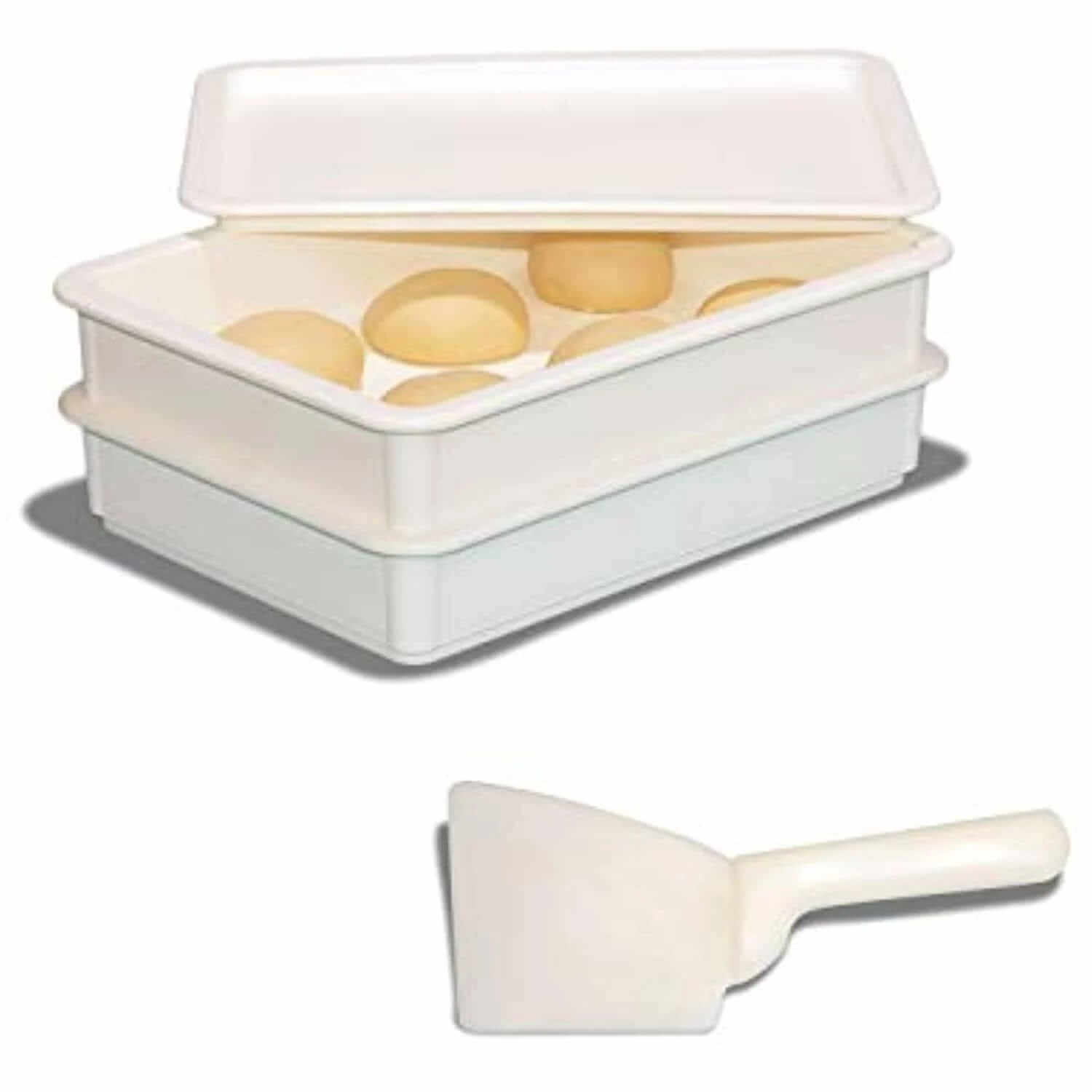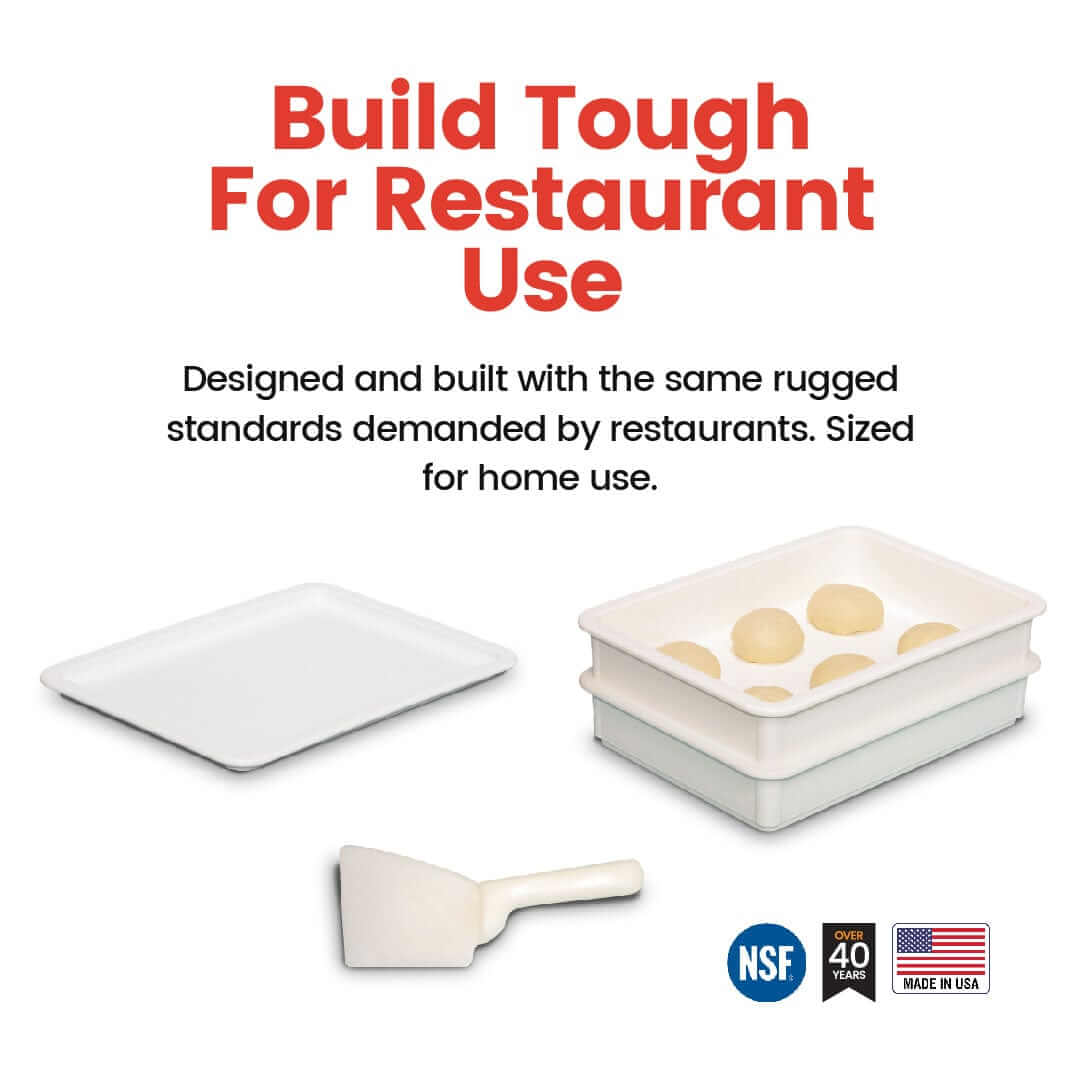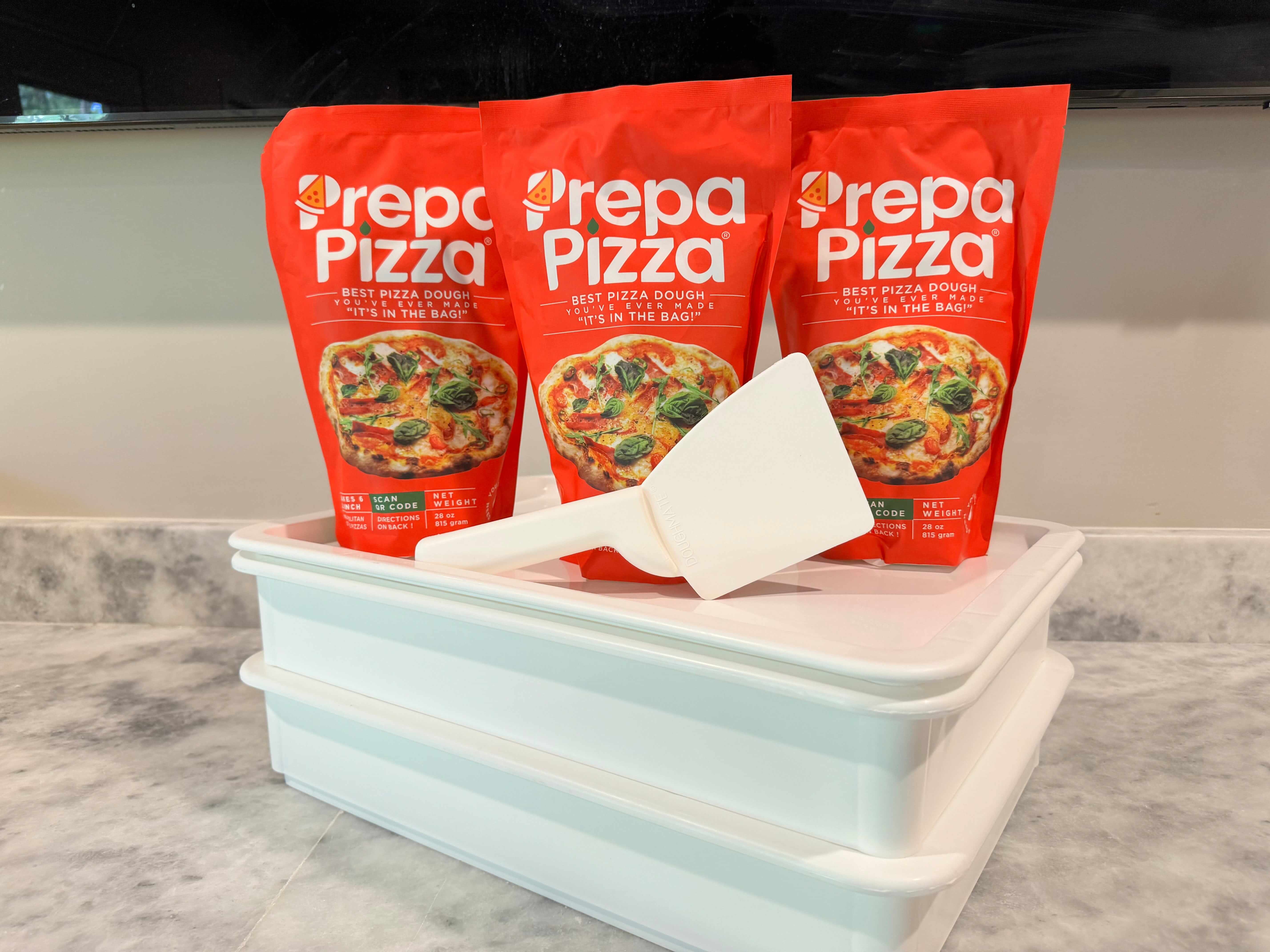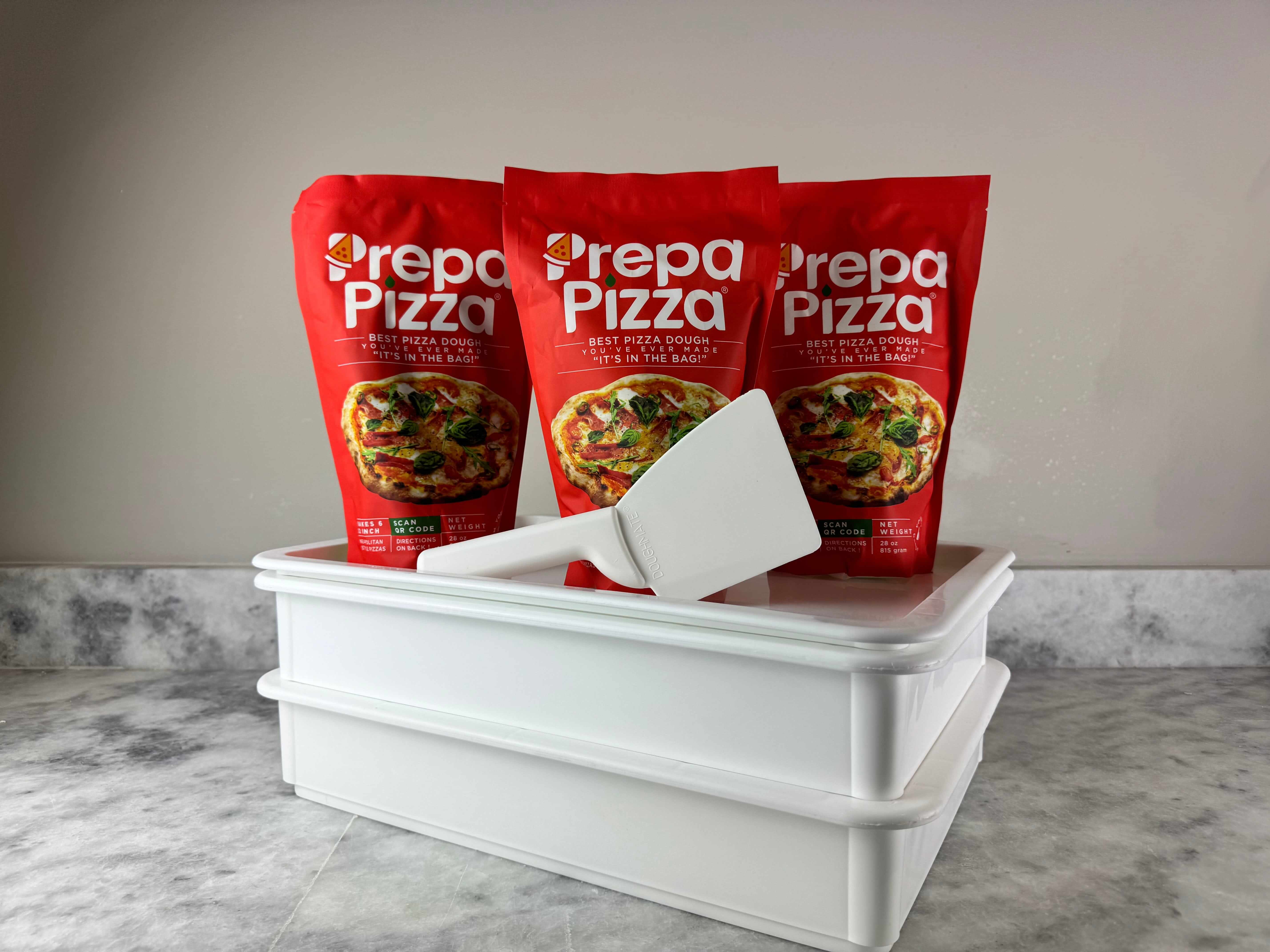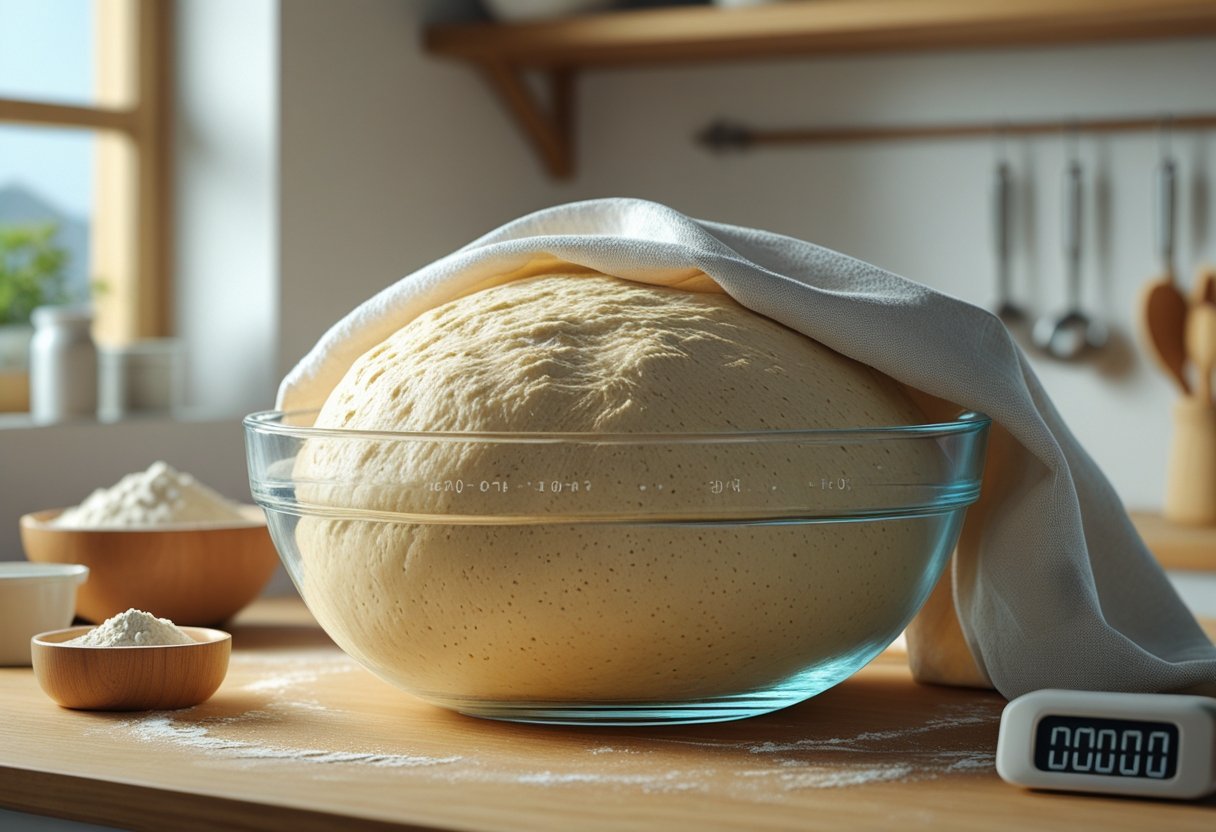
Overnight Dough Ferment Techniques for Enhanced Flavor and Texture
Overnight dough ferment is a simple technique that enhances the flavor and texture of your pizza crust by allowing the dough to rise slowly over time. By fermenting your dough overnight, the yeast works at a slower pace, developing deeper flavors and a better structure for your pizza. Using Prepa Pizza’s premium quality premade dough can help you enjoy these benefits without the hassle of starting from scratch.
With Prepa Pizza’s dough, made from restaurant-quality ingredients, you get a product that is perfectly suited to overnight fermentation. This means you can prepare your pizza ahead of time, letting the dough develop rich taste and improved chewiness before baking. Explore the convenience and quality of Prepa Pizza’s premade dough kit for effortless homemade pizzas any day you choose.
Whether you’re an experienced baker or looking for a straightforward way to elevate your pizza, understanding overnight dough ferment can transform your approach. You’ll notice the difference in every bite when you use quality dough designed for slow, effective fermentation.
Core Principles of Overnight Dough Ferment
Understanding the balance of time, temperature, and yeast activity is essential to mastering overnight dough fermentation. This process allows your dough to develop improved texture and flavor without daily intervention. When using premium dough like Prepa Pizza’s premade dough, you start with quality ingredients designed to respond well to extended fermentation for consistent results. You can explore their product here to see how you can simplify your baking routine with top-tier dough.
The fermentation process controls how your dough rises and mellows. Knowing how yeast behaves overnight helps you manage your dough’s rise and ensures you get an even, controlled fermentation. This knowledge is vital whether you’re preparing dough yourself or using ready-made dough like Prepa Pizza’s premade dough kit.
What Is Overnight Dough Fermentation?
Overnight dough fermentation is the process where dough is allowed to rest and ferment at a low temperature, typically in the refrigerator, for 12 to 24 hours or sometimes longer. This slow, cold fermentation extends the time yeast and bacteria interact with the dough’s sugars and proteins.
During this time, the dough develops fuller, more complex flavors because yeast produces organic acids and alcohol. The extended rest also promotes gluten network strengthening, which improves dough elasticity and structure.
Using Prepa Pizza’s quality premade dough ensures the right balance of flour, yeast, and hydration to make overnight fermentation both predictable and efficient. This gives you more control to prepare dough in advance without sacrificing the quality of your baked goods.
How Extended Fermentation Impacts Dough
Extended fermentation primarily enhances your dough in three key ways: flavor, texture, and digestibility. Longer fermentation allows yeast and bacteria to break down starches and proteins more completely, resulting in a tangier, more nuanced flavor profile.
Texture benefits through improved gluten development. Over time, gluten strands align and strengthen, leading to a more elastic dough that produces a chewier, airier crust. This gradual process avoids over-proofing that can flatten dough structure.
Digestibility may also improve because fermenting breaks down complex carbohydrates, possibly making it easier on your stomach. Using premium dough like Prepa Pizza’s ensures consistent fermentation outcomes, so you avoid the pitfalls of under or over fermented dough.
Yeast Activity During Overnight Fermentation
Yeast is the driving force of fermentation, consuming sugars in the dough and producing carbon dioxide and alcohol, which cause the dough to rise and develop flavor. When fermenting overnight in cold conditions, yeast activity slows significantly but remains steady and controlled.
This slower metabolism means the dough ferments evenly without exhausting the yeast, preventing over-proofing. It also allows more time for enzymes to work on the flour, breaking down proteins and carbohydrates into simpler compounds that enhance flavor and dough structure.
With Prepa Pizza’s dough made using balanced yeast levels, you get predictable yeast activity that aligns perfectly with extended fermentation times. Proper yeast control is vital for achieving consistent rise and flavor without risking dough collapse or unpleasant sourness.
Key Benefits of Overnight Fermentation
Using Prepa Pizza’s premade dough, which is crafted with premium ingredients and restaurant-quality standards, lets you experience the advantages of overnight fermentation without extra effort. This process enhances several important aspects of dough that affect your final pizza, from flavor to texture.
When you let dough ferment overnight, it undergoes a slow transformation that improves gluten structure, flavor complexity, and crumb quality. These factors combine to elevate the overall eating experience of your pizza.
Flavor Development and Complexity
Overnight fermentation allows yeast and bacteria in the dough to slowly break down starches and proteins. This extended breakdown creates organic acids and alcohols, which bring more complex and nuanced tastes to your crust.
Unlike quick-risen doughs, slow fermentation deepens flavor with subtle sour notes and intensified natural sweetness. This means your pizza inherits a richer taste without added sugars or artificial flavoring.
Prepa Pizza’s premade dough takes advantage of this process, delivering consistent flavor complexity right out of the box. Your pizza crust will have a balanced tanginess and aromatic character that only comes from time and patience during fermentation.
Gluten Development Over Time
Gluten development is a critical factor that improves when dough ferments overnight. The slow fermentation process allows gluten strands to form and strengthen gradually, creating a more elastic and extensible dough.
This improved gluten network helps your dough hold gas from yeast activity better, resulting in a dough that’s easier to shape and less likely to tear. It also creates a crust that’s chewy yet tender.
Prepa Pizza’s dough kits provide you with perfectly balanced gluten levels designed to maximize the benefits of the slow ferment. This ensures your pizza has an ideal structure, making baking and eating more satisfying.
Texture and Crumb Improvements
Texture and crumb are noticeably better with overnight fermentation. The prolonged rise time enables even gas distribution and moisture retention within the dough.
This results in a lighter, airier crumb with irregular holes you want in artisan-style pizzas. The crust finishes with a pleasant chew and crisp exterior without feeling dense or doughy.
Using Prepa Pizza’s premade dough, you get a finished product with a texture that reflects careful fermentation and ingredient quality. Your pizza will have a professional-quality crumb and crust that stands up to toppings and sauces beautifully.
Techniques and Best Practices
Mastering overnight dough fermentation requires attention to ingredient handling, temperature management, and timing. These factors shape the flavor, texture, and rise of your dough. Using Prepa Pizza’s premium premade dough ensures quality ingredients and consistent results, letting you focus on perfecting your fermentation process. Explore how these elements work together for optimal dough performance.
Dough Preparation and Mixing
Start with high-quality flour, water, yeast, and salt—the four pillars of dough. If using Prepa Pizza’s premade dough, much of the prep work is done for you, saving time and reducing error. When mixing your own dough, combine ingredients just until incorporated to avoid overworking the gluten.
For better texture, let your dough rest briefly after mixing for initial gluten development. Avoid adding too much yeast; less yeast means a slower, more flavorful fermentation, critical for overnight dough. You can find Prepa Pizza’s dough here for a consistent base that benefits from overnight fermentation.
Temperature Control: Room vs. Refrigerator
Temperature heavily influences fermentation speed and flavor. Holding dough at room temperature speeds up yeast activity but risks over-proofing and inconsistent texture when left overnight.
Cold fermentation in the refrigerator slows yeast, allowing gradual flavor development and improved gluten structure. This method prevents the dough from over-expanding, giving you more control and better results. Ensure your dough is covered to avoid drying out during refrigeration. Using Prepa Pizza’s premade dough works well with cold fermentation, as it’s formulated to perform reliably under these conditions.
| Temperature | Effect on Dough | Ideal Use |
|---|---|---|
| Room Temperature (~70°F) | Faster rise, risk of over-proofing | Short ferment or same-day baking |
| Refrigerator (38-45°F) | Slow, steady rise, flavor builds | Overnight to 24+ hour fermentation |
Fermentation Timelines
Overnight fermentation typically lasts between 8 to 24 hours. Shorter times lean toward moderate flavor enhancement, while longer cold ferments deepen flavor and improve texture.
If fermenting at room temperature, limit the rise to under 8 hours to avoid over-proofing. In contrast, refrigeration can extend the timeline safely, encouraging a more complex fermentation process. The key is to monitor your dough’s rise and avoid letting it collapse.
Prepa Pizza’s premium dough can be refrigerated overnight without compromising texture or flavor, making it suitable for professional and home bakers aiming for consistent, high-quality results through controlled fermentation.
Choosing Ingredients for Overnight Dough
Getting the ingredients right is crucial for successful overnight dough fermentation. You need flours that support gluten development and yeast or starters that ensure a consistent, controlled rise without overproofing. Using high-quality ingredients will help you achieve the ideal texture, flavor, and workability.
If you want convenience with premium quality, Prepa Pizza offers a premade dough kit made from carefully selected ingredients that mimic traditional overnight dough fermentation, saving you preparation time without sacrificing taste.
Selecting the Right Flour
For overnight fermentation, choose bread flour because of its high protein content, typically between 11.5% and 13.5%. This protein forms a strong gluten network which is essential for trapping gases produced over the extended fermentation period. The result is a dough with good elasticity, structure, and chewiness.
Using lower-protein flours can lead to a weaker gluten matrix, causing your dough to collapse or become overly sticky after the long ferment. Whole wheat or specialty flours can be included but often require a blend with bread flour to maintain dough strength.
Prepa Pizza uses premium bread flour in their dough, providing consistent strength and fermentation behavior, which is ideal whether baking immediately or after a cold overnight rest.
Role of Yeast and Starter Types
The yeast you use affects the speed and flavor of fermentation. For overnight dough, a small amount of yeast is preferred to allow a slow, controlled rise that enhances flavor complexity without overproofing.
If you want to experiment with natural leavening, a sourdough starter offers wild yeast and bacteria that create deeper, tangier flavors during long fermentation. However, maintaining a sourdough starter requires more experience and attention to timing compared to commercial yeast.
Prepa Pizza's premade dough leverages a minimal yeast quantity to ensure steady fermentation, balancing flavor and texture with convenience. This method reduces risk of overfermentation, making it accessible even for less experienced bakers wanting consistent results.
Special Considerations for Different Dough Types
When working with overnight dough ferment, understanding how various doughs respond to time and temperature is crucial. Factors like yeast activity, hydration, and ingredient composition influence how you should handle fermentation for the best results. Using high-quality premade dough, such as Prepa Pizza’s dough kit, can simplify this process for home bakers and professionals alike. You can check Prepa Pizza’s product at their Prepa Pizza Dough Kit for restaurant-quality ingredients and consistent fermentation performance.
Your choice of dough will determine how long and at what temperature you ferment overnight. Ready-made dough from Prepa Pizza comes calibrated for these nuances, helping you avoid common pitfalls in dough handling when extending fermentation.
Sourdough and Wild Yeast Doughs
Sourdough and wild yeast doughs perform exceptionally well with overnight fermentation due to their natural, slower yeast activity. The extended time allows wild yeasts and lactic acid bacteria to develop deeper, more complex flavors. This process also enhances gluten structure, producing a chewier and more artisan-style crumb.
You should ferment sourdough in a cool environment, usually in the refrigerator, to control rising speed and avoid overproofing. Using a quality sourdough premade dough, like Prepa Pizza’s, ensures the right balance of hydration and yeast activity, which is critical for managing texture during this slow ferment.
Overnight Pizza Dough Method
Overnight fermentation for pizza dough is ideal for developing optimal dough extensibility and flavor. The slower yeast fermentation, typically in cold storage, breaks down sugars more effectively, giving you a dough that stretches easily and bakes with a crisp yet tender crust.
When using a premade pizza dough like Prepa Pizza’s dough kit, you get consistent fermentation results because the yeast quantity and dough formulation are optimized for cold, long fermentation. This reduces the risk of dough becoming sticky or overly slack, common problems with homemade doughs left too long at room temperature.
Managing Enriched and Lean Doughs
Enriched doughs containing fats, sugars, or dairy need careful attention during overnight fermentation. These ingredients slow fermentation, so yeast levels and proofing time must be adjusted accordingly. Overproofing can lead to dough collapse, while underproofing results in dense texture and poor rise.
Lean doughs, such as those used for artisan breads, benefit from extended slow fermentation to develop flavor and improve gluten strength. When using premade doughs like those from Prepa Pizza, these adjustments are accounted for in the formulation, making the process more predictable. Storing enriched doughs in cooler conditions and lean doughs slightly warmer overnight helps maintain dough integrity across types.
Common Challenges and Solutions
Managing an overnight dough ferment requires control over fermentation time, gluten development, and how you handle the dough afterward. These factors directly influence your dough's texture, flavor, and rise quality.
Using Prepa Pizza's premade dough can simplify this process because it comes with consistent ingredients and quality assurance, reducing the risks common in homemade fermentation. Check out the Prepa Pizza Dough Kit for restaurant-quality dough that supports an optimal ferment.
Preventing Over-Fermentation
Over-fermentation happens when yeast exhausts its food supply, causing the dough to collapse or develop off-flavors. You can prevent this by fermenting your dough at cooler temperatures between 40-50°F (4-10°C), which slows yeast activity and extends fermentation. Using a reliable premade dough like Prepa Pizza’s helps maintain proper yeast levels, reducing your need to adjust yeast amounts.
Keep your dough refrigerated overnight and monitor its rise to avoid over-proofing. If you see excessive bubbling or the dough deflates easily, your fermentation time or temperature may need adjustment. Use a kitchen thermometer to keep the environment consistent and ensure the best results.
Ensuring Robust Gluten Network
A strong gluten network is essential for good dough elasticity and structure. Overnight fermentation improves gluten development by allowing it to build gradually and evenly. Prepa Pizza’s dough benefits from high-quality flour and proper hydration levels that promote this network from the start.
Avoid overworking or under-mixing the dough before fermenting, as this impacts the gluten strands. After fermentation, gently handle the dough to preserve the gluten’s integrity, ensuring it will trap gases well and rise during baking.
Dough Handling After Overnight Fermentation
Once your dough has fermented overnight, handle it with care to maintain its texture and rise potential. Avoid aggressive punching or kneading, which can break down the gluten network and cause poor oven spring.
Instead, gently fold the dough to redistribute yeast and gases, then shape it lightly. If you’re working with Prepa Pizza premade dough, its consistent texture makes this process easier. Let the dough rest at room temperature for 20-30 minutes before baking to reactivate yeast and relax gluten for better shaping and rise.
Proper handling ensures your overnight dough transforms into a well-risen, flavorful crust every time.
Frequently Asked Questions
When working with dough, controlling factors like temperature, fermentation time, and environment is essential for consistent results. Using Prepa Pizza's premade dough can simplify your process while delivering premium quality thanks to restaurant-grade ingredients. Explore their premade dough kit to get started with professional-level dough.
Understanding how overnight bulk fermentation impacts dough characteristics helps you optimize flavor, texture, and handling. Adjustments in time, temperature, and yeast levels can improve your baking outcomes significantly.
What is the optimal temperature for bulk fermenting sourdough overnight?
The best temperature for overnight bulk fermentation is between 40-50°F (4-10°C). This cooler range slows yeast activity, allowing for controlled fermentation and enhanced flavor development. It’s common to use a refrigerator for this stage.
How does bulk fermenting dough in the fridge affect the final bread quality?
Fermenting dough in the fridge results in improved flavor complexity and better gluten development. The slow fermentation allows enzymes and bacteria more time to work, leading to a more open crumb and a sourdough with richer taste.
What are the differences between bulk fermentation on the counter and in the refrigerator?
Bulk fermenting on the counter speeds up yeast activity, which can lead to faster rise but risk over-fermentation. Refrigeration slows the process, extending fermentation time and producing more nuanced flavor while giving you more control over the schedule.
How can you tell if dough has been over-fermented during an overnight bulk ferment?
Over-fermented dough will look slack and loose, often with an excessive rise and collapse. It might have a sour, alcoholic smell and a sticky texture that makes shaping difficult.
What factors should you adjust when bulk fermenting dough for longer than the standard duration?
You should reduce the amount of yeast when extending bulk fermentation time. Temperature control is critical; colder environments slow fermentation, so adjusting these factors prevents over-proofing and maintains dough strength.
Are there risks associated with leaving dough to bulk ferment at room temperature overnight?
Yes, leaving dough out overnight at room temperature can lead to over-fermentation, resulting in weakened gluten structure and poor rise. It can also create an environment conducive to unwanted bacterial growth, compromising taste and texture. Using refrigeration minimizes these risks.




